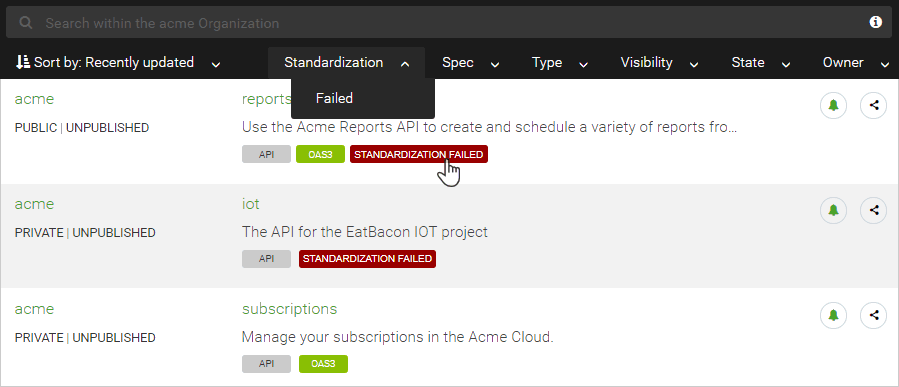An Easy Way to Set and Enforce API Standards at Scale
API-focused teams are constantly looking to improve the speed they can deliver new and updated features in their development workflow. When it comes to API design, one of the most important steps teams can take to improve efficiency and improve the scalability of their API program is to enforce common design standards.
There are many different approaches used to help teams set and enforce common standards, including the use of linters, style validation engines (many of which are built in-house), or even manual review processes. In some cases, this review process can involve an entire team dedicated to validating an API design or reviewing code.
While these approaches can work when dealing with a small set of APIs, none work well at scale. In fact, when we recently surveyed a group of API developers about the API technology challenge they would most like to see solved in the year ahead, standardization was the #1 response.
Today, we are thrilled to introduce a new feature in SwaggerHub to help teams set and enforce API standards at an organizational-level: API Standardization.
How does API Standardization work?
API Standardization helps ensure that your OpenAPI definitions in SwaggerHub comply with your company’s API style guide. Organization owners can choose from various rules to check the operations, parameters and model definitions for compliance. These rules can be applied to all of the APIs that are being developed within their Organization.
Every time a new version of the API is saved, SwaggerHub will automatically validate whether or not the API adheres to the standards. This means that regardless of the project or team, inconsistencies can be detected and fixed early in the API design process before the actual implementations are developed and go live.
Adding API Standardization into your workflow
SwaggerHub is built to easily fit into your existing API development workflow. If you have an existing set of standards you’re using in your API design process today, you can check to see if those roles are supported in SwaggerHub here. API Standardization can also be used in conjunction with our powerful re-usable domain structure, which lets you create a new design in minutes using a library of reusable assets.

Alternatively, if a team is generating a definition through a build or deployment process in a “code first approach,” that definition can be pushed to Swaggerhub and validated to meet organization requirements, something that may have required its own pipeline or process previously.
While we are excited to introduce this functionality, it is just the first step in providing more high-level functionality for teams and organizations. Expect to see a lot more on the API Standardization front early next year, as well as more features designed around speeding up the design and development process of APIs for teams of any size!
See API Standardization in action
API Standardization is available in the Enterprise plan in SwaggerHub.
On Thursday, December 13, we will be hosting a free training, which will include a live demonstration of the new API Standardization feature in SwaggerHub. The webinar, Building and Enforcing API Standards at Scale with Swagger, will look at the challenges team face when designing APIs at scale, and will introduce steps organizations can take to standardize API design.
Register Now